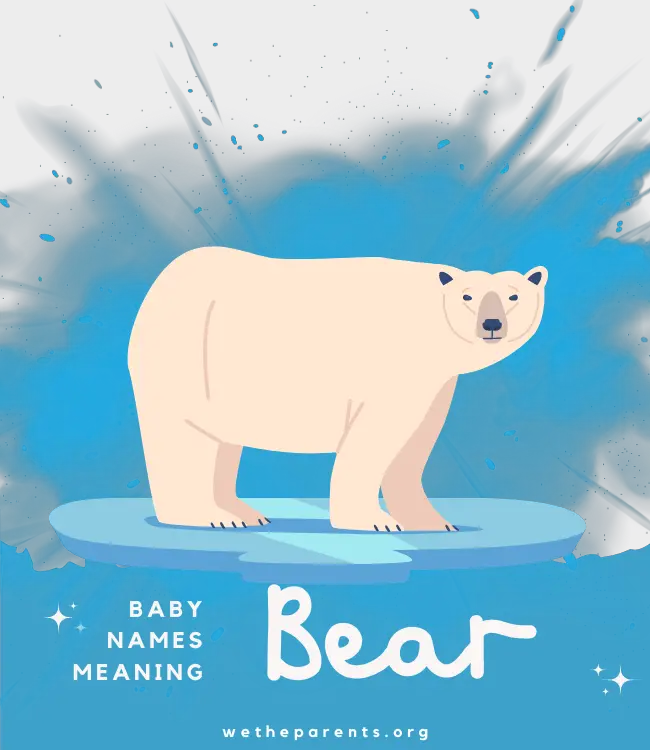Delving into the world of baby names can be as adventurous as encountering a bear in the wild—each name carries its own story and significance. For parents fascinated by strength and resilience, names meaning bear resonate deeply, offering a blend of rugged beauty and protective strength. These names, sourced from a variety of cultures, embody traits like courage and protection, attributes that any parent might wish to inspire in their child. As you explore these names, consider not only their rich historical backgrounds but also the powerful characteristics they represent, making them a profound choice for your child.
Male Names
- Arthur (Celtic Origin) – Meaning “bear,” it’s a royal and legendary name.
- Bernard (German Origin) – Means “bear-hardy,” symbolizing strength and courage.
- Bjorn (Scandinavian Origin) – This name means “bear,” reflecting robust strength.
- Orson (English Origin) – Derived from Latin, meaning “bear cub,” it’s affectionate and strong.
- Espen (Scandinavian Origin) – Derived from the Old Norse “ǫsp,” meaning “god-bear.”
- Torben (Scandinavian Origin) – Means “thunder bear,” ideal for a strong and bold character.
- Osborn (English Origin) – From Old English elements meaning “god bear,” it’s stately and resilient.
- Adalbern (German Origin) – Means “noble bear,” combining nobility and the strength of a bear.
- Auberone (English Origin) – A royal name meaning “noble or royal bear,” inspired by Shakespeare.
- Baer (German Origin) – Translates directly to “bear,” symbolizing fierceness and strength.
- Berold (English Origin) – Means “bear rule,” indicating leadership and strength.
- Bobo (American Origin) – Though often seen as light-hearted, it shares sounds with names meaning bear.
Female Names
- Ursula (Latin Origin) – Meaning “little female bear,” it’s charming and unique.
- Sonja (Scandinavian Origin) – Known for “wisdom,” but also relates to fighting like a bear.
- Orsa (Italian Origin) – Directly means “bear,” offering a beautiful and melodic choice.
- Bera (Icelandic Origin) – Directly translates to “bear,” strong yet feminine with Nordic allure.
- Nita (Native American Origin) – Means “bear” in Choctaw, providing a deep cultural connection.
- Calissa (Greek Origin) – Refers to a mythological Arcadian transformed into a “strong she-bear.”
- Arthurine (Celtic Origin) – A female form of Arthur, meaning “bear,” graceful and elegant.
- Bernadette (German Origin) – Means “strong as a bear,” resilient and bold.
- Artio (Celtic Origin) – A name borne by a Celtic bear goddess, mystical and captivating.
- Andarta (Gaulish Origin) – Means “great bear,” majestic and impressive.
- Ursina (Latin Origin) – A variant of Ursula, meaning “little female bear,” delicate yet strong.
- Yrse (Swedish Origin) – Means “she-bear,” combining femininity with the power of a bear.
Unisex Names
- Teddy (English Origin) – Associated with teddy bears, it’s cute and endearing.
- Bear (English Origin) – A straightforward and bold name.
- Aata (Polynesian, Maori, Tahitian Origin) – Means “bear” and “stone,” exotic and unique.
- Adalbern (Germanic Origin) – Means “noble bear,” regal and distinguished.
- Alfbern (Germanic Origin) – Means “elf bear,” charming and enchanting.
- Andarta (Gaulish Origin) – Means “great bear” or “powerful bear,” powerful and commanding.
- Medved (Russian Origin) – Means “bear” in Russian, suited for both genders with a sense of might.
- Ayı (Turkish Origin) – Simply means “bear” in Turkish, exotic yet easy to pronounce.
- Bhalu (Hindi Origin) – Informally means “bear” in Hindi, playful and endearing.
- Dubu (Swahili Origin) – Means “bear” in Swahili, unique and resonant.
- Hari (Korean Origin) – Means “bear” in Korean, succinct and powerful.
Whimsical Wonders: Names Inspired by Mythical Maidens
Delve into a realm of enchantment with these uniquely crafted names, each inspired by legendary tales and artistic muses. Perfect for parents seeking a name with an air of mystique and heritage, these selections encourage you to embrace creativity in christening your little ones.
- Arthur (Celtic Origin) – Derives from the Celtic word artos, meaning “bear.” King Arthur, a legendary figure in British folklore, lends this name a regal and mythical aura. It’s a noble and timeless choice.
- Orson (Latin Origin) – From the Latin orsus, meaning “bear.” Orson Welles, an iconic figure in film and theater, adds a layer of artistic brilliance to this strong and distinct name.
- Bjorn (Scandinavian Origin) – Means “bear” in Old Norse. Bjorn Borg, the famous Swedish tennis player, enhances this name with a sense of strength and resilience.
- Bernadette (German Origin) – A feminine form of Bernard, combining bern (bear) and hard (brave). This name suggests both strength and elegance, offering a unique choice with a gentle nod to bear-like fortitude.
- Ursula (Latin Origin) – Means “little female bear.” Ursula K. Le Guin, renowned for her speculative fiction, gives this name a creative and intellectual flair.
- Esben (Scandinavian Origin) – Derived from the Old Norse elements esja (god) and bjorn (bear). It’s a less common name that carries a mystic and powerful vibe.
- Callisto (Greek Origin) – In mythology, Callisto was a nymph transformed into a bear and then a constellation. This name resonates with celestial beauty and ancient stories.
- Humphrey (Old English Origin) – From hun (bear cub) and frid (peace). Humphrey Bogart, the iconic American film star, lends a classic and charismatic charm to this name.
- Valentina (Latin Origin) – An indirect connection through Saint Valentine, whose name shares roots with valens (strong, powerful). The bear is a symbol of strength and courage, making Valentina a poetic and powerful choice for a girl.
- Duncan (Scottish Origin) – Although typically linked to dark warriors, the name Duncan can be creatively tied to the strength and solitude of a bear, especially in Celtic cultures where animal names were emblematic of traits.







